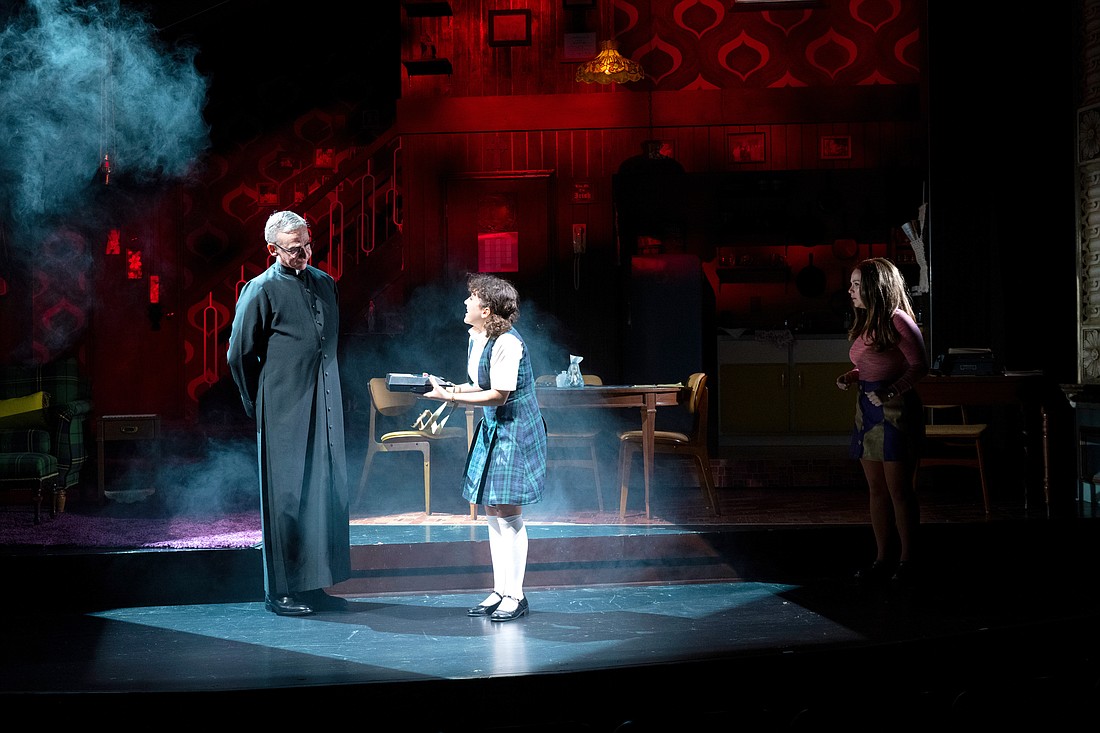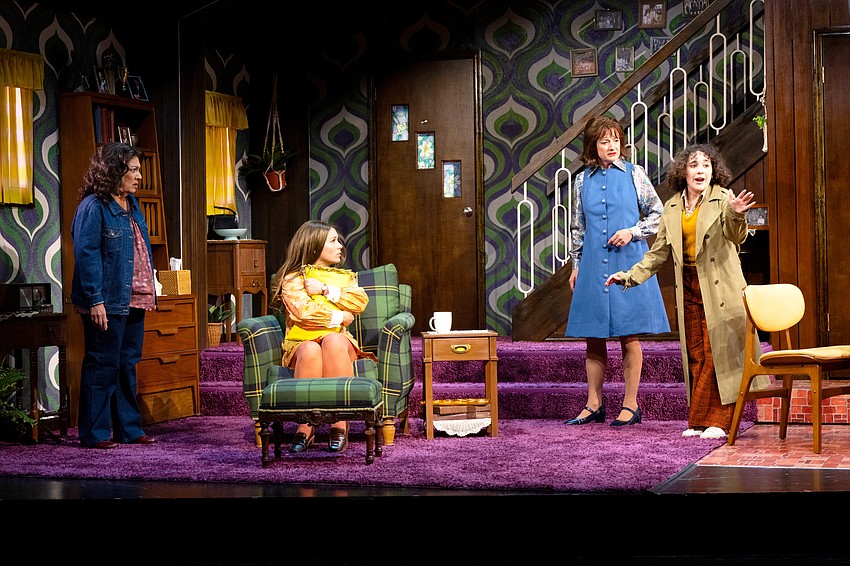- March 12, 2025
-
-
Loading

Loading

People can get bent out of shape about stuff that doesn’t matter. From Alexander Pope’s “The Rape of the Lock” to the “Slowly I Turned” vaudeville sketch, this sad truth has led to laughter. It’s the comic engine driving Katie Forgette’s “Incident at Our Lady of Perpetual Help” on the Asolo Rep stage.
The action unfolds in a blue-collar Catholic community in the 1970s. While officially a “memory play,” it’s an unreliable narrator’s remembrance of things past. That narrator is Linda O’Shea (Erin O’Connor) — an adult telling the story of her 19-year-old self. Back in 1973, something turned teenage Linda’s life upside down — and the rest of the O’Shea family’s lives along with it. Adult Linda’s still wrapping her mind around it.
So what happened exactly? By 21st-century standards, very little. Simply put, er, menstruation. Stephen King used it to set “Carrie” into motion. Forgette used it start her play. (We’re talking comedy, not telekinesis and body horror, so don’t be frightened.)
Linda’s younger sister, Becky (Willa Carpenter) is 13 years old. Her mother Josephine “Jo” (Lise Bruneau) knows “Auntie Flow” will be visiting Becky soon. Jo should share the facts of life with her youngest daughter — but it makes her cry just thinking about it. So she passes the job off to her oldest daughter.
Linda does a good job but uses blunt words. Wannabe detective Becky captures those words on a hidden tape recorder. Father Lovett (Jay Russell), the family’s parish priest, gets his hands on the cassette. In his unforgiving hands, it’s explosive ammunition.

He intends to use it in his next hellfire sermon — and blast the O’Sheas’ reputation to hell and gone. As a good reputation is the only wealth the family has, only a heavenly miracle can save them. Either that, or earthly Irish cunning …
Forgette’s comedy has a great concept. It’s also high-concept — and self-conscious of its own artificial artistry. Director Céline Rosenthal makes the most of the playwright’s hall of mirrors. She gets the audience howling while Linda makes up her mind about what her story really was — and either placates or fends off other family members who want to take control of the narrative.
O’Connor’s Linda is scintillating in both her adult and teenage incarnations. She’s smart, but not a snotty know-it-all. While her wit can be biting, her character’s simpatico, not sneering. O’Connor delivers an appealing portrayal. Good thing. “Incident” is riding on Linda’s shoulders — and only succeeds if she wins you over. O’Connor’s characterization does win you over. (Brava!)
Bruneau’s Jo is the designated Edith Bunker of this household. She’s a multi-tasker who never complains … well, almost never. Suzanne Grodner’s Terri is her sister, and the family’s designated Maude. She’s a fiery feminist willing to turn up the heat when male chauvinists abuse their power.
Carpenter’s Becky is a close cousin to Harriet the Spy — an aspiring sleuth who longs to put on Humphrey Bogart’s trench coat. Russell’s Mike brings home the bacon for the O’Shea brood — and figures his job ends there. He’s a proud workingman — who disdains the uncalloused hands of the callous Father Lovett.
As noted, Russell also plays the priest who quotes 10 judgmental biblical verses for every one that counsels forgiveness. Russell does triple duty. In an old-school drag performance, he plays Betty Heckenbach, a nosy church lady.
Asolo Rep’s other talents keep this time trip on track. The destination is the 1970s. (If you don’t remember the decade, consider yourself lucky. If you do, the flashback might induce painful memories of bad taste.)
Riw Rakkulchon’s set captures the fake-wood paneling and garish patterns of the decade’s ersatz, old-timey interior design. Dee Sullivan’s costumes evoke the layered look of Annie Hall. Sharath Patel’s sound design is also trippy — though his early ’70s tunes are fine as wine. America’s chart-topping music didn’t suck yet.
All this artistry serves the narrative — and what a tangled tale it is.
“Incident” is a bit of a shaggy God story. Forgette indulges Linda’s taste for self-conscious digressions. Linda not only tells her story, she talks about the art of storytelling. I’d call this “post-modern,” but the gag dates back to Laurence Sterne’s “Tristram Shandy” in 1759.
I like this sort of thing, but some theatergoers might be tempted to shout, “Get on with it!” The story does gets lost in narrative cul de sacs at times. That includes the tale that Linda tells — and the parts she doesn’t tell.
Consider the case of the loveless Father Lovett. He pops out of the living room wall to the sound of thunderbolts and lightning like a Bond villain. It’s over the top — and clearly illustrates Linda’s inflated notion of this larger-than-life figure, not the real article.
But what would the reality be? In 1973, Father Lovett's a judgmental, self-righteous martinet. Ah, but in his high school days, the man was a rakehell. OK. So what took the man from point A to point B? What turned Lovett’s character inside out?
There’s a brief mention of a teenage crush that went wrong. The future priest was hot and heavy for “Carol Mulvaney” and then — something bad happened. What?
Linda doesn’t spell it out — and the playwright doesn’t either.
This kind of indirect storytelling reminds me of those pinhole cameras that allow you to look at a solar eclipse without staring directly at the sun.
Lovett’s ambiguity is both intriguing and irritating. But the ambiguity may be the character’s whole point — and any hints would’ve spoiled it.
With Forgette, character ambiguity may be feature, not a bug.
Her play deals with the tension between outward appearance and inner reality. Father Lovett is focused on words, not the stuff that matters.
The O’Shea family cares about solidarity, loyalty and doing what’s right. That’s what really matters.